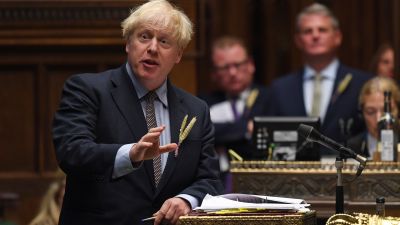Internal Markets Bill: What were the Brexit proposals MPs voted on?

Boris Johnson's controversial plan to override key elements of the Brexit deal he signed with Brussels has cleared its first Commons hurdle despite deep misgivings by some senior Tories.
MPs voted to give the UK Internal Market Bill a second reading by 340 to 263 – a Government majority of 77.
The prime minister said the legislation was necessary to prevent the EU taking an “extreme and unreasonable” interpretation of the provisions in the Withdrawal Agreement relating to Northern Ireland.
He said some in Brussels were now threatening to block UK agri-food exports to the EU and to insist on tariffs on all goods moving to Northern Ireland from the rest of the UK.
But what is the Bill and why has it made so many people, including Tory backbenchers, angry?
The Internal Markets Bill:
Prime Minister Johnson proposed the implementation of the Internal Markets Bill - it is a piece of legislation that will override aspects of the Withdrawal Agreement which was signed by both the EU and UK in October.
If implemented, the Bill will end the legal legitimacy of the Northern Ireland protocol - contained within the Withdrawal Agreement - in areas such as customs and state aid and financial assistance.
It will ensure goods from Northern Ireland continue to have unfettered access to the UK market while making clear EU state aid (a subsidy or any other aid provided by a government that distorts competitions) rules - which will continue to apply in NI - will not apply in the rest of the UK.
When the Withdrawal Agreement was signed, a Joint Committee of senior politicians from the EU and UK was set up so unsettled aspects of the deal could be resolved during the Brexit transition period, which ends at the end of this year.
At present Northern Ireland is supposed to adhere to some EU regulations after the Brexit transition period ends on December 31 in a bid to stop a “hard border” on the island of Ireland.
The PM says he'd hoped the Joint Committee would find a way around this, as he doesn't want the EU to have any say over the UK after the transition period.
The UK's Chief Negotiator David Frost says the EU has refused to guarantee Great Britain "third country status" after this year but has said Northern Ireland is separate and would not require being listed as a third country.
Mr Frost says that under the Northern Ireland protocol, if the UK is not granted third country status, it would be "automatically illegal for NI to import food products from GB".
The government says the Internal Markets Bill is a "safety net" aimed at protecting Northern Ireland and would only be implemented if negotiations fail to reach an agreement.
Why is the Bill controversial?
By overriding the Withdrawal Agreement, the UK would be reneging on an international treaty.
In doing so, the UK would be breaching international law.
The government accepts this, though Northern Ireland Secretary Brandon Lewis said the law would only be broken in a “very specific and limited way”.
Every living former prime minister, Brexit-supporting Tory MPs and the EU have all expressed concerns over the plan.
David Cameron said he has "grave concerns" about any plan that would see the UK "break an international treaty obligation".
Geoffrey Cox, who was Mr Johnson's attorney general when the Withdrawal Agreement was signed, said it would be “unconscionable” to override the Brexit divorce deal.
The Brexit-supporting Tory MP said there is “no doubt” the “unpalatable” implications of the Withdrawal Agreement were known when the prime minister signed it.
The EU has threatened to walk away from negotiations on a free trade deal if the EU does not back down on the Internal Markets Bill by the "end of the month".
Dozens of MPs are angry about the PM's proposals not only because they would break international law if implemented, but they could scupper all hopes of a free trade deal with the EU.
They also say it would reduce ability to sign trade deals with other countries as it would demonstrate that the UK cannot be trusted on international treaties.
Can Boris Johnson be defeated?
It is also possible, though improbable, that the prime minister could be defeated on an amendment to the Internal Markets Bill, which is expected to be voted on next week.
Senior Tory Sir Bob Neill - chair of the Commons Justice Committee - said his amendment would impose a "parliamentary lock" on any changes to the Withdrawal Agreement.
Among its supporters are former prime minister Theresa May and Damian Green, who was her deputy.
Prime Minister Johnson held a conference call with around 250 backbench MPs on Friday in which he tried to convince them to back his proposal.
It has also been indicated that Tories could have the whip removed if they rebel.
The debate this evening, which the prime minister will open, is scheduled to commence at 4.30pm on Monday and a vote is expected at around 10pm.
Mr Johnson will make the case to MPs that it is "critical" that the legislation is passed "before the end of the year" so it can act as a "safety net" if no trade deal is agreed with Brussels before the end of the year.